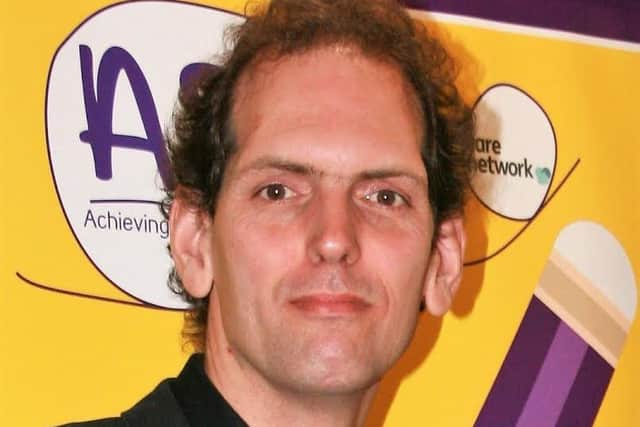'˜Mental health should not be a barrier to working'


Stewart Lucas knows only too well the barriers facing people with mental health issues when it comes to getting a job.
The chief executive of Lancashire Mind has autism. So he views the results of a project by the charity to help get people back into employment as a major breakthrough.
Advertisement
Hide AdAdvertisement
Hide AdTwenty who thought they would never work again have now got full-time paid jobs in the Preston area alone as a result of the Next Steps initiative.


“One in four people in Lancashire has a mental health issue of some form,” said Stewart. “For most it is anxiety or depression and most of those are carrying on living life as normal.
“The 20 unemployed people this project has helped so far never thought they would work again, certainly not paid work.
“They are 20 people who slipped through the safety net and reached the bottom. So this is a tremendous success .
Advertisement
Hide AdAdvertisement
Hide Ad“It won’t change things overnight. It won’t suddenly remove the obstacles that people with mental health problems face getting work. But it’s a great start.”


Next Steps is a national inititiative funded by European financial services giant Societe Generale. Its aim is to get people with mental health issues back into work, volunteering or training.
It offers individual support and awareness training to overcome the problems people living with mental health problems experience when looking for, or staying in, employment.
Lancashire Mind staff worked from job centres over a six month period, supporting to build their mental health and resilience so they can lead a healthier, happier life. Feedback from participants suggests the approach has been very effective with 100 per cent of those who completed the programme saying it improved the quality of their life by, on average, 30 per cent.
Advertisement
Hide AdAdvertisement
Hide AdAll who took part said it had reduced their levels of anxiety and depression and improved their wellbeing by an average of 20 per cent.
One of the unemployed who took part in Next Steps said: “It’s been great. I’ve applied for three jobs since taking part, when I hadn’t applied for any jobs in one-and-a-half years before and I don’t think I would have if I hadn’t come.
“It’s not only made me think about other people, it’s made me realise what impact I have in my own life and got me back on track.”
Stewart explained: “Having a mental health condition doesn’t mean that you can’t excel in any chosen career.
Advertisement
Hide AdAdvertisement
Hide Ad“The funding for Societe Generale has allowed us to make full-time paid work a reality for people with a mental health condition.
“Most importantly it has also allowed us to create 20 role models that show others that having a mental health condition is not a barrier to having a job.
“What it proves is that if you provide the right support and the right intervention you can help people into employment. It deals with the stigma that people with mental health problems are not employable. It completely torpedoes that view.
“People’s views of mental health issues are changing, bit by bit. But it is still the case that mental health is viewed differently to physical health. It is not seen as being as important. Yet they are two sides of the same coin.
Advertisement
Hide AdAdvertisement
Hide Ad“We have spent 30 or 40 years getting rid of the barriers of physical disabilities. But we have not done that for mental health.
“It’s all to do with the assumption that people make about a person with a mental health problem. That is the barrier.
“There are massive issues around unemployment. People who suffer from a problem feel they aren’t going to get a job.
“If society tells you enough times you are unemployable then you start to think you are. Society has created this myth and you start to believe it.”
Advertisement
Hide AdAdvertisement
Hide AdStewart says while unemployment can be the result of a mental health issue, it can also cause the problem as well. But getting people back into work can help stop the spiral.
“Some people say that developing a mental health issue leads to them being out of work,” he expalined. “Some also say unemployment has led to their problems. They feed off each other.
“But change can happen. It isn’t going to come tomorrow. No one project is going to wave a magic wand and solve this.
“But if you look at homosexuality, 47 years ago it was illegal. Now we have same sex marriages. Ten years ago we all smoked in pubs and now no-one does. So change is possible, even if it takes a while to achieve it.
Advertisement
Hide AdAdvertisement
Hide Ad“B y helping people into work, Next Steps can play a role in that change. These people who have managed to get back into employment when they never thought that would ever be possible again can act as evangelists for this.
“The impact is huge. Working alongside people they suddenly start to change the view that many have about mental health problems.
“That’s what is so important about it. Getting people into work is brilliant.
“But if by doing that we can help open people’s eyes and change their view of people with mental health problems then we can finally start to deal with this stigma.
Advertisement
Hide AdAdvertisement
Hide Ad“Twenty people who never believed they would work again are now doing so and that is terrific. Hopefully it will get easier as people’s views start to change.
“We are in talks with job centres about what we can continue to do. It would be great if this was part of the maintsream service.
“We don’t think services like this should have to be provided by charities. It should be on offer for people when they go to their job centre.”